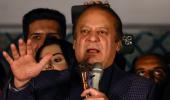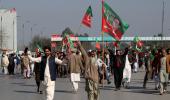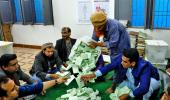Nawaz Sharif sacrificed his ambition to become Pakistan's prime minister for a record fourth term and nominated his younger brother Shehbaz Sharif for the plum post as the powerful Army gave him two options either to choose the premiership or leave it to allow his daughter to become the chief minister of Punjab, according to party insiders.

The nomination of Shehbaz Sharif for the slot of prime minister by the Pakistan Muslim League-Nawaz supremo Nawaz Sharif has stirred quite a debate among the PML-N ranks who are questioning why the 74-year-old three-time premier was "sidelined" despite the earlier announcement on the premiership.
Sources in the PML-N told the Press Trust of India in Lahore that Nawaz Sharif decided to withdraw himself from the race for the prime minister's office for his daughter and political heir, Maryam Nawaz, 50.
"Nawaz Sharif could have become the prime minister to lead the coalition government for the fourth time but then his daughter would have no chance to become the Punjab chief minister. For the love of his daughter, Nawaz sacrificed his wish to become prime minister for the fourth time,” a party insider said.
The sources said that Nawaz Sharif was given two choices by the military establishment after his party's poor performance in the February 8 elections.
The powerful Pakistan Army, which has ruled coup-prone Pakistan for more than half of its 75-plus years of existence, has wielded considerable power in matters of security and foreign policy.
"The first was to become premier of the coalition government in Islamabad and make his younger brother Shehbaz Sharif Punjab chief minister and the other was to leave the top post for Shehbaz and have his daughter Maryam accommodated as the Punjab chief minister. Nawaz chose the second," another source said.
The source said that since Shehbaz Sharif, 72, was a favourite of the military, Nawaz Sharif had to be sidelined by one excuse or another at the end of the day.
Since the PML-N failed to win a simple majority in the 266-member National Assembly, Shehbaz Sharif prevailed over his elder brother Nawaz Sharif in the race for the post of Prime Minister.
This week social media was also abuzz with the PML-N's decision to nominate Shehbaz Sharif as its prime ministerial candidate.
"Pakistan ko Nawaz do (Give Nawaz to Pakistan)" was one of the top trends on X in the country showing resentment over Shehbaz Sharif's nomination.
People in their posts on X asked whether Nawaz Sharif's political career is over.
Initially, the PML-N claimed Nawaz Sharif would be the party's pick for the top slot followed by a full-throttle media campaign in the lead-up to the general elections.
Maryam on Wednesday said her father's decision to withdraw himself from the top slot is related to the PML-N's not securing a clear majority in the polls.
To form a government, a party must win 133 seats out of 265 contested seats in the 266-member National Assembly.
Former prime minister Imran Khan's PTI-backed independent winners lead the lower house (National Assembly) with 92 seats followed by PML-N with 80, Bilawal Bhutto-Zardari's Pakistan Peoples Party with 54 and the Muttahida Qaumi Movement with 17 seats.
Maryam is now set to become the first woman chief minister of Punjab, a crucial province of over 120 million people.
Former premier Imran Khan's Pakistan Tehreek-e-Insaf has alleged that Maryam would become the Chief Minister on its "stolen mandate" thus having no credibility of her selection.
On the other hand, Shehbaz Sharif is all set to form a six-party coalition to run the government early next month.
According to the Election Commission of Pakistan's tally, the total number of general seats won by these six parties comes to 152, which shows they can easily achieve the minimum required number of 169 to form the government at the Centre after the addition of 60 women and 10 minority seats in their tally.
None of the three major parties, the PML-N, the Pakistan People's Party, or the Pakistan Tehreek-e-Insaf have won the necessary seats in the February 8 general elections to secure a majority in the National Assembly and, therefore, will be unable to form a government on their own.
Pakistan recorded a 47.6 percent voter turnout in the February 8 election, which was lower than the previous one in 2018 when 52.1 percent of voters cast the ballot.









